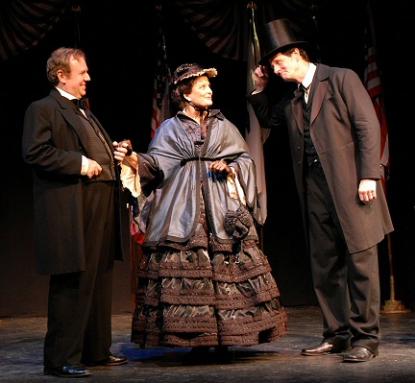 I’m standing on a train platform in Springfield waiting for Abraham Lincoln and Stephen Douglas to appear. Springfield, Massachusetts not Illinois, and the men whose arrival I await are actors. I think, “Is this going to work? Will I believe that these two New York actors are the two participants in what historian Allen C. Guelzo called ’The debates that defined America’?”
I’m standing on a train platform in Springfield waiting for Abraham Lincoln and Stephen Douglas to appear. Springfield, Massachusetts not Illinois, and the men whose arrival I await are actors. I think, “Is this going to work? Will I believe that these two New York actors are the two participants in what historian Allen C. Guelzo called ’The debates that defined America’?”
In 1958, one hundred years after the Lincoln-Douglas debates for the senatorship of Illinois, Norman Corwin was commissioned to write a play about them. The Rivalry premiered on Broadway and then toured America. In 2008 Vincent Dowling, Artistic Director of The Vincent Dowling Theater Company that has mounted Massachusetts performances of The Rivalry, sees not only parallels in the themes of the play for us today but in the play’s characters to the three major rivals in the Presidential election of this past year. Lincoln, Stephen Douglas and Mrs. Adele Douglas – Obama, McCain, and Hillary Clinton. The play is one history lesson that Dowling wanted young students to witness.
Things weren’t good in 1858. Broken levees and swollen rivers flooded much of the Midwest and tornadoes further devastated the region. There was a major mortgage crisis and recession. In 2008 natural disasters struck the heartland again and economic hard times returned. In 1858 the Civil War was looming. America has two wars now. And in both times two relatively inexperienced lanky Illinois politicians known for their oratorical skills came forward to do battle with two well-established seasoned U.S. Senators.
A very tall man (Christian Kauffman) emerges from the train with a shorter, stout man (Peter Cormican).
“Mr. Lincoln and Mr. Douglas,” I yell. “Your carriage (a Honda) awaits.”
In creating his play, Corwin has fashioned his script using the actual words spoken by Lincoln and Douglas, interspersing the debates with private scenes between Stephen and Adele and Adele and Lincoln. It is here, in the more intimate, personal scenes, where the principals express their fears, passions, insecurities, and hopes that “The Rivalry” shows us what a history book cannot.
The Lincoln-Douglas debates were a series of seven encounters up and down Illinois. The two rivals campaigned by rail accompanied by scores of reporters, greeted by canons, bands, and crowds of thousands. Shorthand was used for the first time and the lightning-like wire of the telegraph spread the debate story across the nation. Democrat and Republican newspapers spun and slanted their reports. How Fox News or MSNBC would have covered the campaign I do not know, but the modern campaign had been born.
Adele Douglas (played by Mary Linda Rapelye) to Lincoln: “How do you keep your temper when someone publishes a full-blown lie about you?”
Abe replies, “If one were to run down all the insinuations, inveracities, and innuendoes uttered against a man in public, life would be nothing but a perpetual flea hunt.”
What would Lincoln think of the internet and cable television? And what would he have thought of the November 2008 Presidential election?
Rehearsal is three weeks long. Fancy hoop dresses for Adele. Black period suits for the candidates and one stove pipe hat.
Students at the Academy of Charlemont are the first audience. They boo and cheer Lincoln and Douglas, and they listen intently.
At another preview the audience is very small; we are upstaged by Obama and McCain and their first Presidential debate.
We open in Chester. There is light and sound. My question is answered. As the stage lights dimmed on the men trying to keep a country and a Union together, I cried.
Lincoln said, “What constitutes the bulwark of our liberty and independence. Not our frowning battlements, our army and navy . . . our defense is in the spirit which prizes liberty as the heritage of all men . . .”
Twelve-hundred students from ages 8-18 saw The Rivalry in Western Massachusetts.
The Rivalry will be performed at the State House on Lincoln’s birthday in the shadow of the statue of Colonel Robert Gould Shaw and the 54th Massachusetts all-black Civil War volunteer infantry.
Slavery was at the heart of the Lincoln-Douglas debates and whether that issue would be decided on the basis of states’ rights or human rights. Questions flow from the Lincoln-Douglas debates. Allen Guelzo asks: “What is democracy’s purpose? Is it to satisfy the desires of the majority? Or is it to achieve a just and moral public order? These were the real questions in 1858 that led to the Civil War.” These are questions that remain for us Americans in this 21st century.
To mark the 200th anniversary of the birth of Abraham Lincoln, Mass Humanities andThe Vincent Dowling Theater Company present
The Rivalry
A playabout the Lincoln-Douglas debates of 1858,by Norman Corwin
Directed by Vincent Dowling
Endorsed by the Massachusetts Abraham Lincoln Bicentennial CommissionThursday, February 12th,10:00 am and 2:00pm (please allow extra time to pass through State House security)
The State House, Gardner Auditorium, BostonHistorians will lead post-performance “talk back” conversations with audience members.
Free and open to the public. Students and school groups are welcome.An open dress rehearsal will be held February 11th at 10:00 am.
PHOTO by Rick Teller, 2008


